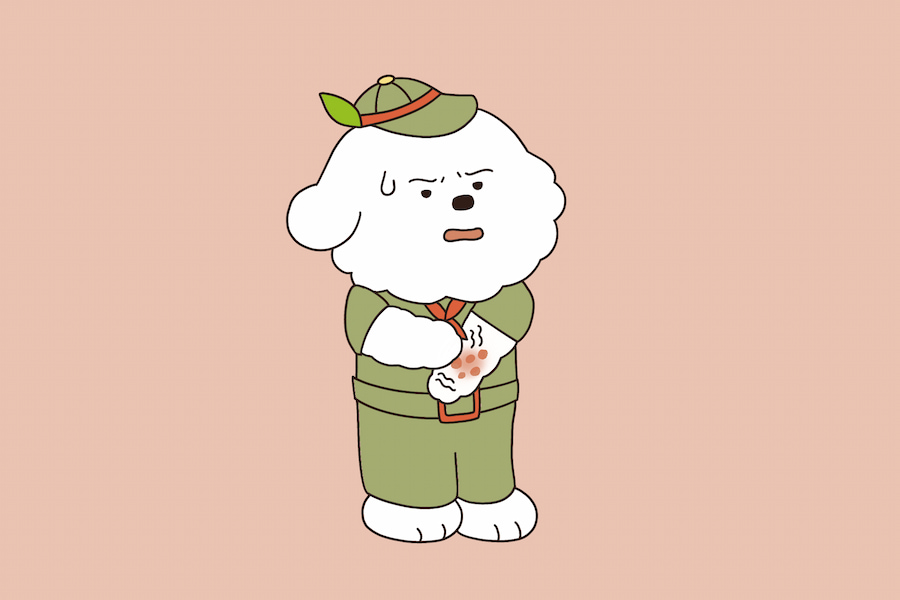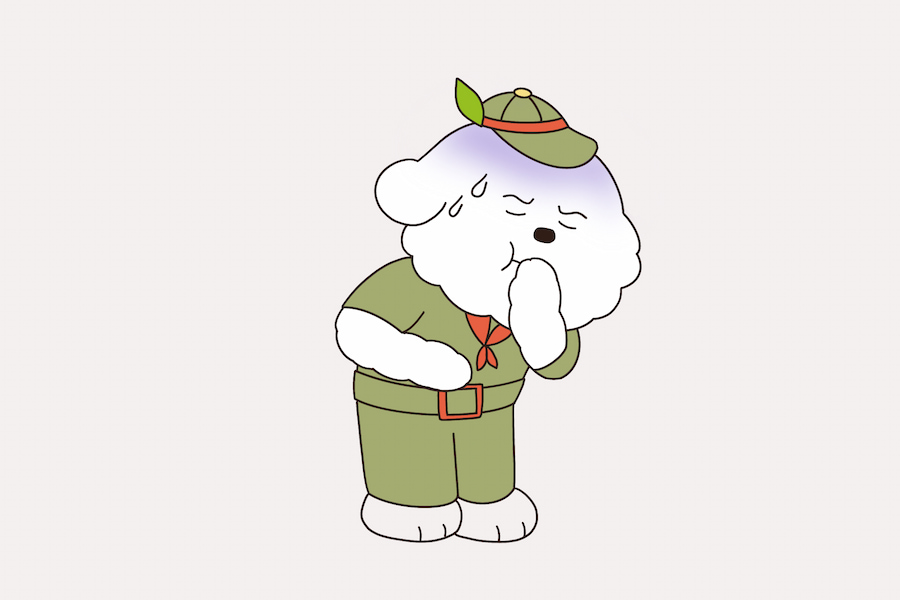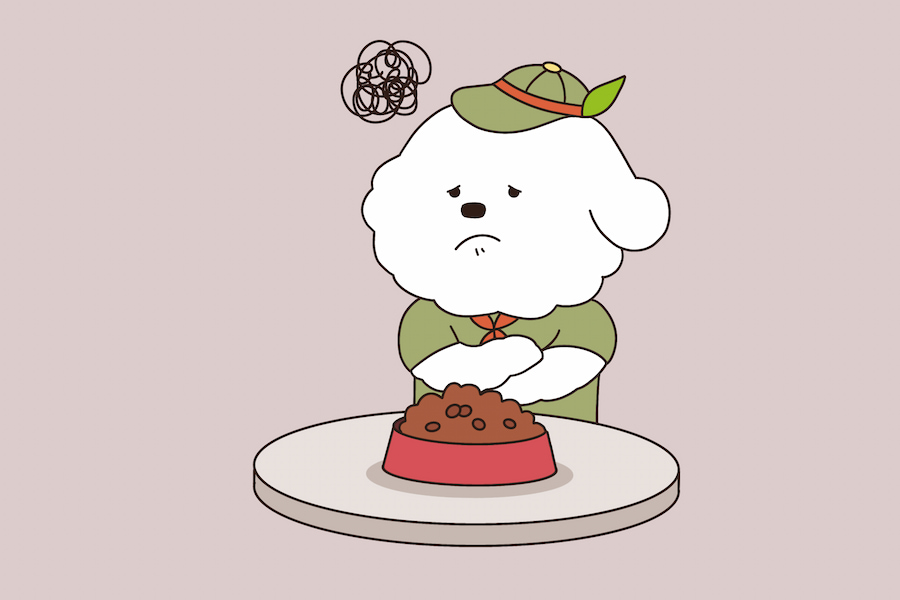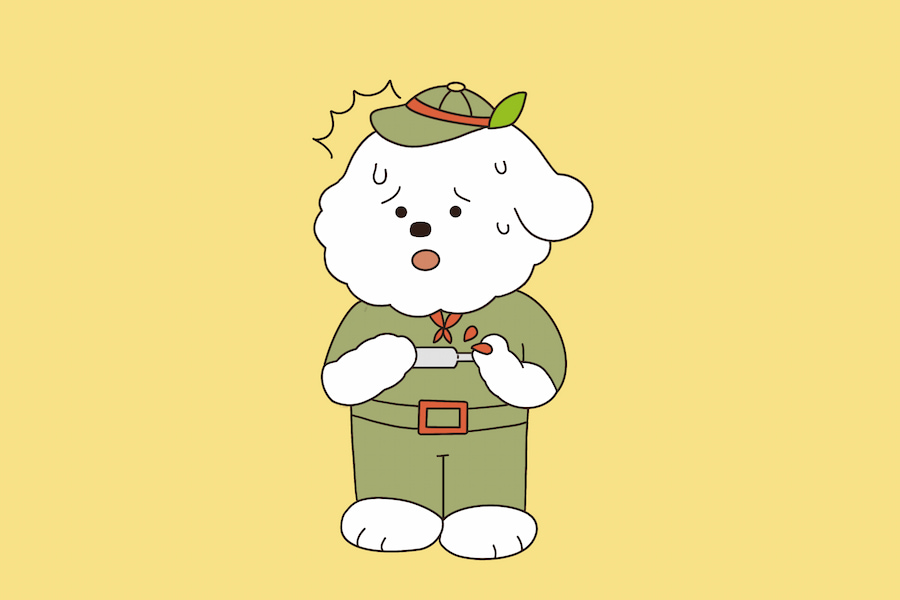Most pet owners confuse food allergies with food sensitivities, and it’s quite common. Dogs are also sensitive to certain foods just like humans. This leads to serious health concerns. A food allergy not only affects your dog’s digestion process and skin but its overall well-being. It’s not that complicated to find the signs of food allergies in dogs.
First-time dog owners should look for the underlying causes of these allergies to find the perfect solution. There are some best food choices for dogs suffering from food allergies. The article discusses different symptoms and causes related to dog food allergies and the possible ways to prevent them in the future.

LeeAndPol offers hypoallergenic treats made with low-allergen dried pollock, thoroughly remove salt and bone over 24 hours for a safe, enjoyable treat for your dog!
What is Food Allergy in Dogs?
Food allergies in canons results from hypersensitive reaction in the immune system. This mistaken identification of immune system regarding certain proteins in the dog’s diet leads to food allergy. You talk will experience different skin issues such as itching, rashes, vomiting, diarrhea, and others. The prominent allergens come from chicken, dairy, wheat, beef and soy. Once your dog has been identified for food allergy then follow the elimination diet method without any excuse. This method requires you to determine the sources of proteins and carbs that contribute to allergy. After that gradually eliminate them from your dog’s diet for several weeks and monitor his condition. In this way you can manage the food allergies in dogs with the help of your veterinarian.
Causes of Food Allergies in Dogs
1. Genetic Predisposition
The food allergy problem is most of the time inherited. If the parent breed has a food allergy, then definitely the young ones will have it also. Certain breeds such as Labradors, Spaniels and Bulldogs have greater chances after developing allergic reactions because of their inherited traits. You can manage food allergies in dogs only once you understand this genetic link.
Most Common Dog Breeds with Food Allergies
Any dog breed can develop food allergies, but there is a greater risk among certain dog breeds that include:
- Dachshunds
- Terriers
- Retrievers
- Bulldogs
- Spaniels
2. Immune System Response
The dog’s immune system mistakenly considered a food protein as harmful, and then this causes food allergies. When that a specific food protein enters in the dog’s body, the immune system responds to that allergenic food by producing antibodies that causes inflammation.

The immune response also gets intensified when the dog is exposed to the allergens more often.
Common Symptoms of Food Allergies in Dogs
Skin Reactions
It is evident for dogs to develop severe itching, scratching, and biting around different areas of their face, especially ears, when suffering from food allergies. Identify the inflamed skin areas with redness and rashes to have a better idea about the allergic reaction.
Gastrointestinal Issues
A dog who suffers from loose stools and chronic vomiting along with bloated belly is all because of food allergy. The consumption of an allergenic food causes indigestion because of the inflammation. This ultimately disturbed the normal functioning of the gut. Your dog will develop symptoms like diarrhea, vomiting, and gas. In the end the digestive system will severely be affected due to food allergy in your dog.
Ear Infections
Ear infections occur continuously in dogs and results from food allergies. The allergens in the food trigger the inflammatory response in dogs leading to inflammation in the entire body including the ears as well this increases the risk of infections in which you dog excessively scratches and rubs his ears being uncomfortable all the time. Carefully observe your dog, and if your dog shakes the head constantly followed by discharge from the ears, then this occurs due to a food allergy.
Behavioral Changes
Dogs facing food allergies often show physical discomfort. This happens because your dog is struggling to digest certain food that is causing problems. Food allergies are typically the cause of a dog’s behaviour when they become irritable, aggressive, lethargic, hyperactive, and short-tempered.

The dried pollock in LeeAndPol’s products has anti-inflammatory properties and is easy to digest, helping manage food allergy symptoms in dogs!

How to find out the triggers that lead to food allergies?
Identifying food allergy triggers in dogs is essential. The easy and reliable way to test your dog for food allergies is by using the elimination diet trial method.
- You have to select a hypoallergenic diet or the one with limited ingredients in dog food containing a novel protein and a single carbohydrate source. You have to feed your dog this type of diet for around 8 to 12 weeks. During this time, you have to avoid other treats and supplements to get the best results.
- Once elimination phase is over, then again reintroduce one ingredient in your dog’s diet and note the adverse reactions. Keeping track of the ingredients in food will help you identify the triggers.

Make sure everything is done in consultation with the vet. Your vet will finalize the results and will give you a dietary plan for the good health of your dog in the future. Finally, you will come to an effective diet for your dog that is healthy and free from allergens.
What are the most common foods that cause allergies in dogs?
The most common allergens include:
- Dairy
- Wheat
- Beef
- Chicken
- Fish
- Soy
Best Food Options for Dogs with Allergies
Dried Pollock
The primary cause of food allergies in dogs is protein, an essential nutrient. However, if your dog has a food allergy, dried pollock can be a safe and excellent source of protein. It is rich in natural vitamins and minerals, including calcium, iron, and omega-3 fatty acids, making it a nutritious and beneficial supplement for your dog’s diet.
Apple
For dogs with food allergies, apples are also among the hypoallergenic foods that are best. It is high in fiber, which helps relieve indigestion symptoms caused by allergies, and contains vitamins A and C to strengthen your dog’s immune system.
Pineapple
Pineapple contains bromelain, a protein-digesting enzyme that can help break down proteins that may trigger food allergies in dogs and aid in digestion.
Pears
Pears are a great fruit for dogs with allergies. They are rich in vitamins A and C, which help boost your dog’s immune system. And their high water content aids in digestion. Additionally, pears are among the fruits with a low likelihood of allergic reactions, making them an excellent treat for dogs with food allergies.
Strawberries
Pet owners looking for a safe and healthy treat for their allergic dog must consider strawberries. They boost the immune system and are good for the overall health of your dog.
Hypoallergenic Dog Foods
This diet includes a minimum number of ingredients so that you can easily track the potential allergens. Some other diets have proteins that are broken down into further smaller components to prevent the chances of any allergic reaction in dogs.
Homemade Dog Treats
You can consider homemade dog treats that are very effective for allergies. In this treat, you can control over different ingredients so that you can avoid any allergic reactions. Once your dog is well suited to homemade dog treat, then you can minimize the allergic problem in the days to come.
Grain-Free
Gluten is a plant-based protein. It can cause an allergic reaction in dogs, leading to inflammation in the intestines and hindering digestion. Feeding gluten-free foods can help prevent food allergies.

All of LeeAndPol’s products are gluten-free and combine dried pollock with freeze-dried fruits and vegetables to make the best treats for dogs with food allergies!
How to treat a dog with food allergies?
Treating a dog with food allergies:
1. Avoid Harmful Foods:
Identify the Allergens
Every time a food allergic reaction occurs, there is a certain potential allergen behind it. In case of your dog, find out such ingredients and foods and try to get rid of them. Veterinarian assistance is needed during this critical time.
Read the Labels
In commercial dog foods, the ingredients are written, and after reading the labels, you can find the allergens. Also keep in mind that there are some unlabelled ingredients as well. Don’t trust the commercial food labels blindly, and try to rely on natural dog food.
2. Medicine for food allergy in dogs:
Along with dietary management, medication is also required to relieve the symptoms of food allergies in dogs.
Antihistamines
Veterinarians prescribe over the-counter antihistamines to manage skin conditions associated with food allergies.
Corticosteroids
When your dog has a severe allergic reaction, then corticosteroids are prescribed to reduce this auto-immune response and inflammation of the skin.

But corticosteroids must be used with the prescription of the veterinarian.
Topical Treatments
You can find medicated shampoo that alleviates the skin discomfort due to allergic reactions. You should also use moisturizing creams to keep the skin hydrated.
Supplements
Omega-3 fatty acids and probiotics are among the best and most effective supplements to minimize skin problems in dogs who suffer from food allergies.
What are some long-term effects of food allergies in dogs?
Food allergies in dogs are manageable, but they have certain long term effects in dogs when left untreated. Your dog will have secondary skin infections if continuously exposed to allergens. With the passage of time, the immune system gets affected, and your dog is likely to suffer from other serious health problems. This also affects your dog’s behaviour which becomes irritated and aggressive.
Conclusion
Food allergies in dogs affect their overall wellbeing. It’s important for pet owners to find out the symptoms and causes to manage this problem. In consultation with the vet, you have to eliminate certain ingredients and foods from your dog’s diet only by identifying the allergens in order to avoid the food allergies. With the guidance of your veterinarian, offer a diet to your dog for a healthy lifestyle.
FAQ
There is no such cure for food allergies in dogs. All you can do is avoid the allergens and manage certain ingredients in your dog’s diet; only then can you treat the food allergy symptoms successfully.
Dogs with food allergies can be offered treats prepared using safe ingredients. Avoid the commercial treats available on the market that have hidden ingredients that can cause allergic reactions.
Being a pet owner it becomes challenging to look for the best protein option for dog with allergy. Dried pollock can be one of the safe and best protein options for dogs facing food allergies. Contains natural vitamins and minerals and full field your dog’s nutritional needs very well.
Note the signs of a food allergic reaction and take your dog to the vet to find out the causes of the allergic reaction.



